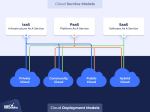“Cloud Computing benefits organizations in many ways. In fact, the benefits are so numerous that it makes it almost impossible not to consider moving business operations to a cloud-based platform.”
Everybody’s talking about the cloud today. Granted, not everyone has a clear picture of what cloud computing is and what it does, but that doesn’t stop the topic from being discussed by professionals and anyone else who is acquainted with the internet.
We begin with a refresher on the meaning of the term “Cloud Computing.”
What Is Cloud Computing?
Cloud Computing is the process of delivering on-demand IT services, including analytics, databases, networking, servers, and storage via the internet. These virtual services provide faster innovation, ease of scalability, and greater resource flexibility.
Most cloud models require you to pay only for the resources you use, making it a cost-effective method of incorporating IT into your business without investing in an in-house data center.
Cloud technologies include virtual services such as Software as a Service (SaaS), Platform as a Service (PaaS), and Infrastructure as a Service (IaaS), to name a few.
Top Benefits of Cloud Computing
- Cost savings: One of the main benefits of cloud computing is that it can help reduce costs. For example, businesses no longer need to invest in expensive on-premises hardware and software. Instead, they can access cloud-based applications and services on a pay-as-you-go basis.
- Scalability: Cloud computing is highly scalable. This means that businesses can easily scale up or down their usage of cloud-based resources as their needs change.
- Flexibility: Another benefit of cloud computing is that it offers greater flexibility than traditional on-premises IT infrastructure. For example, businesses can quickly provision new resources as they need them and can also easily release them when they no longer need them.
- Agility: Cloud computing can help businesses achieve greater agility. This means that they can be more responsive to changes in market conditions and can quickly roll out new applications and services.
- Improved security: Cloud computing can offer improved security compared to traditional on-premises IT infrastructure. This is because cloud providers have expertise in security and can offer a variety of security features, such as data encryption and intrusion detection.
- Enhanced collaboration: Cloud computing can help improve collaboration among employees. For example, they can share files and documents more easily and can access applications and services from anywhere.
- Increased productivity: Cloud computing can help employees be more productive. For example, they can access cloud-based applications and services from anywhere and can use them on any device.
- Disaster recovery: Cloud computing can help businesses recover from disasters more quickly. This is because they can use cloud-based backup and disaster recovery services.
- Environmental benefits: Cloud computing can help businesses reduce their carbon footprint. This is because cloud providers use energy-efficient data centers and use renewable energy to power their operations.
- Improved customer experience: Cloud computing can help businesses improve the customer experience. This is because they can use cloud-based applications and services to provide a better experience to customers.
Final Thoughts
Capturing these benefits from Cloud Computing is not just about lift and shift. You need to plan your cloud journey and formulate a roadmap for cloud adoption.
🅐🅚🅖
Interested in Management, Design or Technology Consulting, contact anil.kg.26@gmail.com
Get updates and news on our social channels!
LATEST POSTS
- A Tale Of Two Frameworks: Spring Boot vs. Django
 “Spring Boot’s convention over configuration approach simplifies development, allowing developers to focus on building robust applications rather than wrestling with… Read more: A Tale Of Two Frameworks: Spring Boot vs. Django
“Spring Boot’s convention over configuration approach simplifies development, allowing developers to focus on building robust applications rather than wrestling with… Read more: A Tale Of Two Frameworks: Spring Boot vs. Django - Unleashing The Power Of Django
 “Django, akin to a Swiss Army knife, provides a comprehensive toolkit, facilitating developers in tackling diverse web development challenges with… Read more: Unleashing The Power Of Django
“Django, akin to a Swiss Army knife, provides a comprehensive toolkit, facilitating developers in tackling diverse web development challenges with… Read more: Unleashing The Power Of Django - Potential of Progressive Web Apps (PWAs)
 “PWAs are not just about technology; they are about creating meaningful connections with users.” Why PWAs Are the Next Frontier… Read more: Potential of Progressive Web Apps (PWAs)
“PWAs are not just about technology; they are about creating meaningful connections with users.” Why PWAs Are the Next Frontier… Read more: Potential of Progressive Web Apps (PWAs) - Unleashing The Power Of Spring Framework
 “Spring Framework simplifies enterprise Java development, but it does so in a way that embraces existing frameworks and infrastructure.” –… Read more: Unleashing The Power Of Spring Framework
“Spring Framework simplifies enterprise Java development, but it does so in a way that embraces existing frameworks and infrastructure.” –… Read more: Unleashing The Power Of Spring Framework - Key Trends Of OSINT In 2024
 “The future of OSINT lies in our ability to adapt and innovate. By embracing emerging technologies and ethical best practices,… Read more: Key Trends Of OSINT In 2024
“The future of OSINT lies in our ability to adapt and innovate. By embracing emerging technologies and ethical best practices,… Read more: Key Trends Of OSINT In 2024 - Can Google’s Carbon Language Replace C++?
 “While Carbon may excel in performance-critical domains, it cannot replace the versatility and extensive ecosystem of C++.” As the world… Read more: Can Google’s Carbon Language Replace C++?
“While Carbon may excel in performance-critical domains, it cannot replace the versatility and extensive ecosystem of C++.” As the world… Read more: Can Google’s Carbon Language Replace C++? - Integration of Design Thinking, Lean, and Agile
 “Innovation thrives when Design Thinking, Lean, and Agile converge, creating a powerful force that propels organizations towards excellence.” In today’s… Read more: Integration of Design Thinking, Lean, and Agile
“Innovation thrives when Design Thinking, Lean, and Agile converge, creating a powerful force that propels organizations towards excellence.” In today’s… Read more: Integration of Design Thinking, Lean, and Agile - Benefits Of Infrastructure as Code (IaC)
 “Infrastructure as Code is the single most important thing you can do to improve the agility, reliability, and security of… Read more: Benefits Of Infrastructure as Code (IaC)
“Infrastructure as Code is the single most important thing you can do to improve the agility, reliability, and security of… Read more: Benefits Of Infrastructure as Code (IaC) - Power Of Internet of Everything (IoE)
 “The true power of the Intebrnet of Everything lies not in the things themselves, but in the connections and insights… Read more: Power Of Internet of Everything (IoE)
“The true power of the Intebrnet of Everything lies not in the things themselves, but in the connections and insights… Read more: Power Of Internet of Everything (IoE) - How Is The Enterprise IoT Evolving?
 “IoT is not just about connecting things; it’s about connecting minds, creating experiences, and transforming industries.” Pavan Singh, IoT Mentor… Read more: How Is The Enterprise IoT Evolving?
“IoT is not just about connecting things; it’s about connecting minds, creating experiences, and transforming industries.” Pavan Singh, IoT Mentor… Read more: How Is The Enterprise IoT Evolving? - IT Pricing Strategy And Models
 “The art of pricing lies in finding the perfect balance between capturing value and satisfying customers.” In the ever-evolving landscape… Read more: IT Pricing Strategy And Models
“The art of pricing lies in finding the perfect balance between capturing value and satisfying customers.” In the ever-evolving landscape… Read more: IT Pricing Strategy And Models - What Is SYCL (“sickle”)?
 “SYCL provides a powerful and intuitive programming model that simplifies heterogeneous computing, allowing developers to write portable code that can… Read more: What Is SYCL (“sickle”)?
“SYCL provides a powerful and intuitive programming model that simplifies heterogeneous computing, allowing developers to write portable code that can… Read more: What Is SYCL (“sickle”)? - What Is A Data Lakehouse?
 “With a data lakehouse, organizations can break down data silos, democratize data access, and accelerate innovation by enabling data exploration… Read more: What Is A Data Lakehouse?
“With a data lakehouse, organizations can break down data silos, democratize data access, and accelerate innovation by enabling data exploration… Read more: What Is A Data Lakehouse? - 5G – The Future Of The Internet
 “5G is the next big step in the evolution of wireless technology. It will offer significantly faster speeds and lower… Read more: 5G – The Future Of The Internet
“5G is the next big step in the evolution of wireless technology. It will offer significantly faster speeds and lower… Read more: 5G – The Future Of The Internet - Ransomware Groups Are Switching To Rust
 “Rust is to Ransomware what a lockpick is to a thief – a powerful tool that can be used for… Read more: Ransomware Groups Are Switching To Rust
“Rust is to Ransomware what a lockpick is to a thief – a powerful tool that can be used for… Read more: Ransomware Groups Are Switching To Rust - Streaming Data Pipelines
 “A streaming data pipeline is like a river: it flows continuously, changes constantly, and requires monitoring to ensure it stays… Read more: Streaming Data Pipelines
“A streaming data pipeline is like a river: it flows continuously, changes constantly, and requires monitoring to ensure it stays… Read more: Streaming Data Pipelines - Why Rust Is Best?
 “Rust is a systems programming language that runs blazingly fast, prevents segfaults, and guarantees thread safety.” Rust is a modern… Read more: Why Rust Is Best?
“Rust is a systems programming language that runs blazingly fast, prevents segfaults, and guarantees thread safety.” Rust is a modern… Read more: Why Rust Is Best? - Database Sharding Explained
 “Database sharding is like breaking a large puzzle into smaller, more manageable pieces, enabling improved scalability, performance, and availability, but… Read more: Database Sharding Explained
“Database sharding is like breaking a large puzzle into smaller, more manageable pieces, enabling improved scalability, performance, and availability, but… Read more: Database Sharding Explained - Ambient Computing Will Be The Future Tech
 “Ambient computing creates a seamless technology-rich environment, but challenges in privacy, security, ethics, interoperability, user acceptance, and technical complexity must… Read more: Ambient Computing Will Be The Future Tech
“Ambient computing creates a seamless technology-rich environment, but challenges in privacy, security, ethics, interoperability, user acceptance, and technical complexity must… Read more: Ambient Computing Will Be The Future Tech - Key Trends Of OSINT In 2023
 “OSINT is not just a technique, it’s a mindset. It’s about looking at the world with an open mind and… Read more: Key Trends Of OSINT In 2023
“OSINT is not just a technique, it’s a mindset. It’s about looking at the world with an open mind and… Read more: Key Trends Of OSINT In 2023 - Why Is OSINT Important?
 “OSINT is not just a technique, it’s a mindset. It’s about looking at the world with an open mind and… Read more: Why Is OSINT Important?
“OSINT is not just a technique, it’s a mindset. It’s about looking at the world with an open mind and… Read more: Why Is OSINT Important? - DataOps Explained
 “DataOps is the practice of integrating data engineering and data analytics to enable agile development, testing, and deployment of data-driven… Read more: DataOps Explained
“DataOps is the practice of integrating data engineering and data analytics to enable agile development, testing, and deployment of data-driven… Read more: DataOps Explained - Transformation Platform as a Service (tPaaS)
 “tPaaS is all about enabling Digital Transformation by providing a platform that supports fast, agile and secure development and deployment… Read more: Transformation Platform as a Service (tPaaS)
“tPaaS is all about enabling Digital Transformation by providing a platform that supports fast, agile and secure development and deployment… Read more: Transformation Platform as a Service (tPaaS) - Hello Julia – Programming Language For Scientific Computing
 “Julia is a high-level, high-performance dynamic programming language designed for numerical computing, data science, and scientific computing.” The Julia Language… Read more: Hello Julia – Programming Language For Scientific Computing
“Julia is a high-level, high-performance dynamic programming language designed for numerical computing, data science, and scientific computing.” The Julia Language… Read more: Hello Julia – Programming Language For Scientific Computing - Top Programming Languages For Fintech
 “The top programming languages for Fintech are those that provide robust and secure frameworks for handling sensitive financial data, as… Read more: Top Programming Languages For Fintech
“The top programming languages for Fintech are those that provide robust and secure frameworks for handling sensitive financial data, as… Read more: Top Programming Languages For Fintech - How To Choose A NoSQL Database
 “SQL databases are like Excel spreadsheets. They’re good for storing structured data that you need to query in a specific… Read more: How To Choose A NoSQL Database
“SQL databases are like Excel spreadsheets. They’re good for storing structured data that you need to query in a specific… Read more: How To Choose A NoSQL Database - Zero Knowledge Proof Explained
 “Zero Knowledge Proof is a powerful cryptographic tool that enables secure and private communication without revealing sensitive information, making it… Read more: Zero Knowledge Proof Explained
“Zero Knowledge Proof is a powerful cryptographic tool that enables secure and private communication without revealing sensitive information, making it… Read more: Zero Knowledge Proof Explained - Embracing Decentralized CyberSecurity
 “Decentralized CyberSecurity moves responsibilities and controls away from the center, to the individual areas most vulnerable to attack today.” Security… Read more: Embracing Decentralized CyberSecurity
“Decentralized CyberSecurity moves responsibilities and controls away from the center, to the individual areas most vulnerable to attack today.” Security… Read more: Embracing Decentralized CyberSecurity - Global Impact of Ransomware Attacks
 “The global impact of ransomware attacks is a sobering reminder that cybersecurity is not just about protecting our data and… Read more: Global Impact of Ransomware Attacks
“The global impact of ransomware attacks is a sobering reminder that cybersecurity is not just about protecting our data and… Read more: Global Impact of Ransomware Attacks - Process Orchestrator Explained
 “Process orchestrator is the ultimate tool for achieving operational excellence, enabling you to optimize processes, improve productivity, and reduce costs.”… Read more: Process Orchestrator Explained
“Process orchestrator is the ultimate tool for achieving operational excellence, enabling you to optimize processes, improve productivity, and reduce costs.”… Read more: Process Orchestrator Explained - What Does Platform Engineering Do?
 “The success of a Digital Platform depends on the strength of its underlying engineering. Solid engineering principles ensure reliability, scalability,… Read more: What Does Platform Engineering Do?
“The success of a Digital Platform depends on the strength of its underlying engineering. Solid engineering principles ensure reliability, scalability,… Read more: What Does Platform Engineering Do? - Are Full-Stack Developers Obsolete?
 “According to the Stack Overflow 2016 Developer Survey, Full-Stack Developers are one of the highest-paid and most sought-after professionals today.”… Read more: Are Full-Stack Developers Obsolete?
“According to the Stack Overflow 2016 Developer Survey, Full-Stack Developers are one of the highest-paid and most sought-after professionals today.”… Read more: Are Full-Stack Developers Obsolete? - Top 5 Issues For Overusing Microservices
 “Microservices should only be seriously considered after evaluating the alternative paths.” The overuse of new architectural styles is common within… Read more: Top 5 Issues For Overusing Microservices
“Microservices should only be seriously considered after evaluating the alternative paths.” The overuse of new architectural styles is common within… Read more: Top 5 Issues For Overusing Microservices - Customer Experience (CX) Trends In 2023
 “Customer Experience is the next competitive battleground. It’s where business is going to be won or lost.” Tom Knighton, Executive… Read more: Customer Experience (CX) Trends In 2023
“Customer Experience is the next competitive battleground. It’s where business is going to be won or lost.” Tom Knighton, Executive… Read more: Customer Experience (CX) Trends In 2023 - Cognitive Computing In 2023 And Beyond
 “IBM defines Cognitive Computing as systems that learn at scale, reason with purpose and interact with humans naturally.” 2022 was… Read more: Cognitive Computing In 2023 And Beyond
“IBM defines Cognitive Computing as systems that learn at scale, reason with purpose and interact with humans naturally.” 2022 was… Read more: Cognitive Computing In 2023 And Beyond - Top 7 Digital Transformation Trends In 2023
 “The threat of a recession coupled with the ongoing need for transformation and growth means CIOs must make force multiplying… Read more: Top 7 Digital Transformation Trends In 2023
“The threat of a recession coupled with the ongoing need for transformation and growth means CIOs must make force multiplying… Read more: Top 7 Digital Transformation Trends In 2023 - Top 5 DevOps Trends in 2023
 “The Global DevOps market size is expected to expand at a CAGR of 24.59% by 2027, reaching over 22199.4 million… Read more: Top 5 DevOps Trends in 2023
“The Global DevOps market size is expected to expand at a CAGR of 24.59% by 2027, reaching over 22199.4 million… Read more: Top 5 DevOps Trends in 2023 - Top 5 Cybersecurity Predictions For 2023
 “Cybersecurity will continue to be a major focus for company leaders as they bolster their digital defenses in 2023 and… Read more: Top 5 Cybersecurity Predictions For 2023
“Cybersecurity will continue to be a major focus for company leaders as they bolster their digital defenses in 2023 and… Read more: Top 5 Cybersecurity Predictions For 2023 - Top 5 Cloud Computing Trends In 2023
 “Cloud Computing has been one of the most critical technologies of the last decade.” The ongoing mass adoption of Cloud… Read more: Top 5 Cloud Computing Trends In 2023
“Cloud Computing has been one of the most critical technologies of the last decade.” The ongoing mass adoption of Cloud… Read more: Top 5 Cloud Computing Trends In 2023 - 10 Technology Trends For 2023
 What are the best new technologies to learn to improve your career and knowledge? Technology today is evolving at a… Read more: 10 Technology Trends For 2023
What are the best new technologies to learn to improve your career and knowledge? Technology today is evolving at a… Read more: 10 Technology Trends For 2023 - Top 5 AI /ML Trends In 2023
 “AI continues to transform our world as companies look to win over consumers with intelligent experiences delivered in real time… Read more: Top 5 AI /ML Trends In 2023
“AI continues to transform our world as companies look to win over consumers with intelligent experiences delivered in real time… Read more: Top 5 AI /ML Trends In 2023 - Android Runs Better When Covered In Rust
 “C/C++ should no longer be used to start new projects and that Rust should be deployed where a language without… Read more: Android Runs Better When Covered In Rust
“C/C++ should no longer be used to start new projects and that Rust should be deployed where a language without… Read more: Android Runs Better When Covered In Rust - Cybersecurity Mesh Architecture (CSMA)
 “CSMA is geared toward simplifying security architecture by encouraging collaboration and integration of a corporate security architecture.” One of the… Read more: Cybersecurity Mesh Architecture (CSMA)
“CSMA is geared toward simplifying security architecture by encouraging collaboration and integration of a corporate security architecture.” One of the… Read more: Cybersecurity Mesh Architecture (CSMA) - Data Mesh And It’s Principles
 “Data Mesh is a strategic approach to modern data management and a way to strengthen an organization’s digital transformation journey,… Read more: Data Mesh And It’s Principles
“Data Mesh is a strategic approach to modern data management and a way to strengthen an organization’s digital transformation journey,… Read more: Data Mesh And It’s Principles - Hard Tech To Disrupt The Future
 “Affordable robotics, AI-driven sensor fusion, uninterrupted connectivity and supermaterials are merging into the technology stack to unlock massive new tranches… Read more: Hard Tech To Disrupt The Future
“Affordable robotics, AI-driven sensor fusion, uninterrupted connectivity and supermaterials are merging into the technology stack to unlock massive new tranches… Read more: Hard Tech To Disrupt The Future - Top 5 Cloud Computing Vulnerabilities
 “Protecting your organization requires accepting the fact that your systems will be breached at some point; therefore, your strategy should… Read more: Top 5 Cloud Computing Vulnerabilities
“Protecting your organization requires accepting the fact that your systems will be breached at some point; therefore, your strategy should… Read more: Top 5 Cloud Computing Vulnerabilities - What’s Next After Cloud Computing – Edge?
 “Now, some companies are looking to replace Cloud Computing with something called Sky, Edge, or Hybrid Computing.” In the past few… Read more: What’s Next After Cloud Computing – Edge?
“Now, some companies are looking to replace Cloud Computing with something called Sky, Edge, or Hybrid Computing.” In the past few… Read more: What’s Next After Cloud Computing – Edge? - Chip To Cloud IoT
 “Chip-to-Cloud IoT looks like a promising way to .build a more secure, useful and decentralized technology for all.” Shannon Flynn… Read more: Chip To Cloud IoT
“Chip-to-Cloud IoT looks like a promising way to .build a more secure, useful and decentralized technology for all.” Shannon Flynn… Read more: Chip To Cloud IoT - How To Secure The Cloud
 “Encryption, Configuration are one of the best ways to secure your Cloud Computing systems.’ Fortunately, there is a lot that you… Read more: How To Secure The Cloud
“Encryption, Configuration are one of the best ways to secure your Cloud Computing systems.’ Fortunately, there is a lot that you… Read more: How To Secure The Cloud - Top 7 Advanced Cloud Security Challenges
 “Before jumping feet-first into the Cloud, understand the new and continuing top Cloud Security challenges your organization is likely to… Read more: Top 7 Advanced Cloud Security Challenges
“Before jumping feet-first into the Cloud, understand the new and continuing top Cloud Security challenges your organization is likely to… Read more: Top 7 Advanced Cloud Security Challenges - Why Cloud Security Is Important
 “Cloud Security is the whole bundle of technology, protocols, and best practices that protect Cloud Computing environments, applications running in… Read more: Why Cloud Security Is Important
“Cloud Security is the whole bundle of technology, protocols, and best practices that protect Cloud Computing environments, applications running in… Read more: Why Cloud Security Is Important - Why Implement Zero Trust Security Model?
 “Zero Trust extends the principle of ‘least privilege’ to its ultimate conclusion: Trust no one and grant the least privilege,… Read more: Why Implement Zero Trust Security Model?
“Zero Trust extends the principle of ‘least privilege’ to its ultimate conclusion: Trust no one and grant the least privilege,… Read more: Why Implement Zero Trust Security Model? - Advantages And Disadvantages Of Cloud Computing
 “When weighing the Cloud Computing advantages and disadvantages, it’s important to keep the sources of those pros and cons in… Read more: Advantages And Disadvantages Of Cloud Computing
“When weighing the Cloud Computing advantages and disadvantages, it’s important to keep the sources of those pros and cons in… Read more: Advantages And Disadvantages Of Cloud Computing - Benefits Of Cloud Computing
 “Cloud Computing benefits organizations in many ways. In fact, the benefits are so numerous that it makes it almost impossible not… Read more: Benefits Of Cloud Computing
“Cloud Computing benefits organizations in many ways. In fact, the benefits are so numerous that it makes it almost impossible not… Read more: Benefits Of Cloud Computing - Why WebAssembly Is The Future Of Computing?
 “WebAssembly is a binary instruction format and virtual machine that brings near-native performance to web browser applications, and allows developers… Read more: Why WebAssembly Is The Future Of Computing?
“WebAssembly is a binary instruction format and virtual machine that brings near-native performance to web browser applications, and allows developers… Read more: Why WebAssembly Is The Future Of Computing? - Virtualization In Cloud Computing
 “Virtualization and Cloud Computing are often discussed interchangeably, but while they’re closely associated, these tech terms have crucial differences.” Virtualization… Read more: Virtualization In Cloud Computing
“Virtualization and Cloud Computing are often discussed interchangeably, but while they’re closely associated, these tech terms have crucial differences.” Virtualization… Read more: Virtualization In Cloud Computing - Cloud Service And Deployment Models
 “I don’t need a hard disk in my computer if I can get to the server faster… carrying around these… Read more: Cloud Service And Deployment Models
“I don’t need a hard disk in my computer if I can get to the server faster… carrying around these… Read more: Cloud Service And Deployment Models - Why Use Serverless Computing
 “Serverless Computing is a Cloud computing execution model that lets software developers build and run applications and servers without having… Read more: Why Use Serverless Computing
“Serverless Computing is a Cloud computing execution model that lets software developers build and run applications and servers without having… Read more: Why Use Serverless Computing - Spatial Computing Revolutionizing Our World
 “Today, new technologies are advancing at dizzying speeds –impacting all areas of our lives, including how we shop and pay… Read more: Spatial Computing Revolutionizing Our World
“Today, new technologies are advancing at dizzying speeds –impacting all areas of our lives, including how we shop and pay… Read more: Spatial Computing Revolutionizing Our World - Trending Fullstack Frameworks
 “Writing the first 90 percent of a computer program takes 90 percent of the time. The remaining ten percent also… Read more: Trending Fullstack Frameworks
“Writing the first 90 percent of a computer program takes 90 percent of the time. The remaining ten percent also… Read more: Trending Fullstack Frameworks - Threat Intelligence Explained
 “Threat intelligence is evidence-based knowledge about an existing or emerging menace or hazard to assets that can be used to… Read more: Threat Intelligence Explained
“Threat intelligence is evidence-based knowledge about an existing or emerging menace or hazard to assets that can be used to… Read more: Threat Intelligence Explained - Docker’s Role In Microservices
 “Docker is an open platform for developing, shipping, and running applications. Docker enables you to separate your applications from your… Read more: Docker’s Role In Microservices
“Docker is an open platform for developing, shipping, and running applications. Docker enables you to separate your applications from your… Read more: Docker’s Role In Microservices - Why Is Kafka The First Choice For Microservices?
 “Kafka is an event streaming platform used for reading and writing data that makes it easy to connect Microservices.’ When… Read more: Why Is Kafka The First Choice For Microservices?
“Kafka is an event streaming platform used for reading and writing data that makes it easy to connect Microservices.’ When… Read more: Why Is Kafka The First Choice For Microservices? - Pros And Cons Of Microservices Architecture
 “Microservices Architecture has become increasingly popular in recent years. It offers a number of advantages over traditional monolithic architectures, but… Read more: Pros And Cons Of Microservices Architecture
“Microservices Architecture has become increasingly popular in recent years. It offers a number of advantages over traditional monolithic architectures, but… Read more: Pros And Cons Of Microservices Architecture

